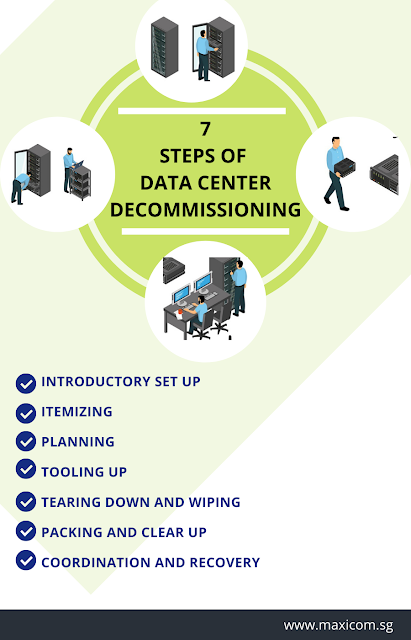7 Steps Of Data Center Decommissioning
Data Center Decommissioning Checklist:
INTRODUCTORY SET UP
We start by drafting a scope of work together. What is the budget? Identify each of the internal stakeholders associated with the work. Identify necessary workflows and backup systems to ensure there is not a critical loss of power or data.
ITEMIZING
Map out all of the hardware and software assets involved in the decommissioning. Follow up with a physical review. Compile a comprehensive inventory: servers, racks, storage equipment, hard drives, SSDs, HVAC equipment, networking gear, firewalls, routers, software licenses, virtualization hardware, keyboards, mice, power equipment, cabinets, and so on. Identify and retain all software licenses associated with servers and networking equipment. Create detailed asset map listing equipment and location of items to be decommissioned. Work with your ITAD provider to determine the final designation for each item: will you reuse, remarket, or recycle? What are the opportunities for asset recovery?
PLANNING
When will you implement the decommissioning, Create an implementation plan listing roles and how long do you estimate it will take? Create necessary workflows and backup systems to ensure there is not a critical loss of power or data. Put together a contact list of vendors you might need before, during, and after the work. Prepare tracking numbers for each earmarked asset, and cancel vendor maintenance contracts for affected equipment. Identify how you will data sanitize storage devices.
TOOLING UP
List out the tools and labor you will need for the data center decommissioning forklifts, hoists, device shredders, degausser, pallets, packing foam, hand tools, labels, boxes, crates. What type of packing foam for the different equipment you will be boxing? Be specific at every stage about what the job requires. If you will be hiring outside resources, undertake the necessary background and security checks ahead of time. Maxicom, ITAD experts leverage their extensive knowledge to help you understand the specific requirements for your job.
TEARING DOWN AND WIPING
Meet stakeholders ahead of the decommissioning. Run through the plan and iron out details. Do you plan to regroup once the work is underway to review progress? On the day of the decommissioning, safely disconnect equipment from the network according to the plan. Tag assets. For data storage equipment, will devices be transported offsite for sanitization and handling elsewhere? What is the process for issuing digital certificates of data sanitization? Erase, degauss, shred, or otherwise prepare for recycling each device as specified. We will ensure a comprehensive data sanitization plan is not only in place but is executed seamlessly.
PACKING AND CLEAR UP
The teardown is complete, and packing can begin. Have you reserved a dedicated space for packing assets? For items earmarked for reuse within the organization, follow the handover protocol. For assets destined for refurbishing or recycling, pack and label for the intended recipients. Use asset management software to track all stages. If you are working in colocation, what are the requirements for how the vacated space should be left? For on-premise, make sure you follow the stipulations laid out in the project plan for clearing and cleaning the tear-down space. At Maxicom, we are masters at logistics.
COORDINATION AND RECOVERY
Communicate with the IT and accounting teams to secure disposed assets are recorded accordingly. For refurbished assets, coordinate with your ITAD provider to confirm secure chain of responsibility and receipt of sanitization certificates for storage hardware. Ensure you receive itemized certificates of destruction for items earmarked for destruction or deemed as not recoverable. What is the total value recovered and returned to your IT budget? Assess similarly for recycled hardware. Your ITAD provider will assist with each stage of the process to ensure you are maximizing return from your retiring assets. Analysis documentation before and after the process to compliance with responsible recycling practices.




Comments
Post a Comment